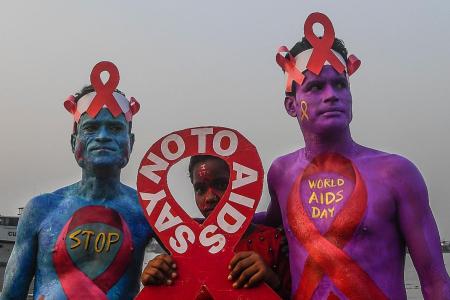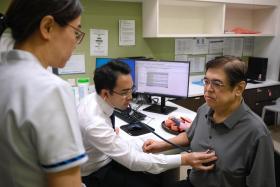Downward trend for HIV cases in Singapore
Greater awareness among youngsters has reduced stigma of the disease, with more willing to undergo treatment
The number of new human immunodeficiency virus (HIV) cases reported among Singaporeans and permanent residents has been going down, even as more people are going for voluntary screenings.
In line with World Aids Day yesterday, the Ministry of Health (MOH) and the Health Promotion Board (HPB) released figures that showed a downward trend of HIV incidences here over the last four years. There were 275 cases detected between January and October. This is slightly higher than the 265 diagnosed in the same period last year.
But the corresponding figures for 2017 and 2016 were 361 and 319 respectively. The full-year figures were 313 last year, 434 in 2017 and 408 in 2016.
Doctors said they have noticed a greater awareness among the young here, especially homosexuals. They said having HIV talked about more has reduced the stigma of the disease, with many now more willing to undergo treatment.
Dr Leong Hoe Nam, an infectious disease specialist at Mount Elizabeth Novena Hospital, said: "Young people are more aware that a diagnosis does not mean their lives are over. Some of them know others who have HIV who are living good, happy lives."
He said those who have their infections detected early can receive treatment with "practically no side effects" and "no changes to their projected life span".
It is actually the older population that is more concerning, Dr Leong said.
"They tend to think of themselves as more invincible, or smarter about their choice of sexual partners.
"But HIV has a really long incubation period. Not only do they not get treatment when they are not diagnosed, they could pass it on to their partners too."
Of the newly reported cases, 19 per cent were detected through voluntary screening, a 2 percentage point improvement from last year.
The majority - 55 per cent - were detected by tests done in the course of medical care, while another 20 per cent were found through routine programmes of HIV screening.
About 49 per cent were diagnosed at a late stage, down from 53 per cent last year.
Dr Piotr Chlebicki, an infectious disease specialist at Mount Alvernia Hospital, said: "Recent studies have shown quite clearly that if treated early, patients can have their HIV become 'undetectable', which means it cannot be transmitted to others.
"That is much better than treating it later on when the immune system could already have suffered irreversible damage."
The authorities analysed 154 of the new cases, and found that those aged between 20 and 39 accounted for 41 per cent of them, while those between 40 and 59 years made up 40 per cent. All were exposed to the virus through sexual intercourse.
HIV, the virus that causes Acquired Immune Deficiency Syndrome (Aids), can be transmitted through unprotected sex acts or through sharing of needles or other injection equipment. In some cases, it can also be passed on to a child by the mother during pregnancy, or through breastfeeding.
MOH and HPB urged individuals at risk of HIV infection to go for regular HIV tests.
Get The New Paper on your phone with the free TNP app. Download from the Apple App Store or Google Play Store now


